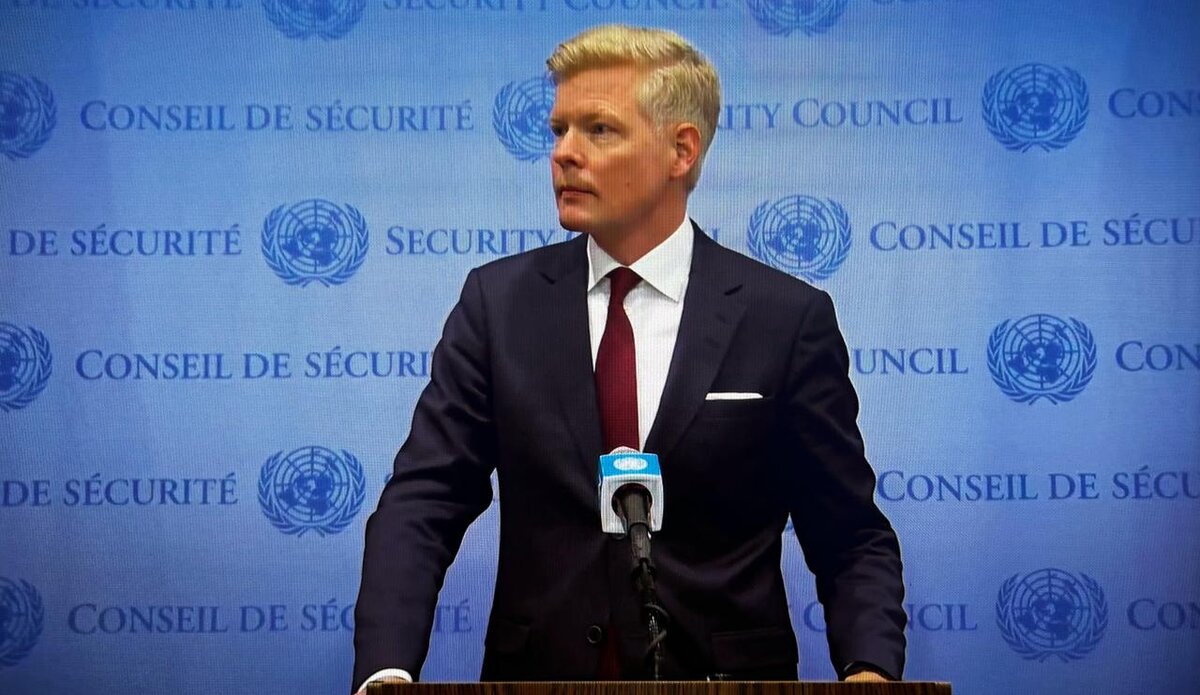Transcript of a media stakeout by UN Special Envoy for Yemen, Hans Grundberg, following his briefing to the Security Council
Good morning, everyone, or good afternoon.
I am glad to be here with you today. I will just say a few words first about where we are with mediation efforts in Yemen. As I just briefed the Council, recent developments, including the continued escalation in the Red Sea, is complicating the mediation space for finalizing and implementing the United Nations roadmap. This roadmap is meant to operationalize the parties’ commitments to a ceasefire, the resumption of an inclusive political process under UN auspices, and measures to improve living conditions in Yemen.
I also cautioned that the longer the escalatory environment continues, the more challenging it will become. I therefore emphasized the importance of remaining focused on the long-term aims that we are seeking to achieve in Yemen. The needs and the priorities of the Yemeni population have not changed since the recent regional escalation, and they have only grown more urgent.
Therefore, the strategic objective and the focus of my work and the work of my office remains firmly in place. And we continue to work with the parties to bridge gaps and identify ways to initiate a ceasefire, resume a political process, and implement the measures they agreed.
I am happy to take a few questions.
Thank you very much.
Questions and Answers
Question from Associated Press: Thank you very much Mr. Grundberg, Edith Lederer from The Associated Press. Have you spoken to the Houthis about their missile attacks on the Red Sea, on shipping, and, if so, what’s their reaction been, I assume, to the international community’s great calls for this to stop. And what are the implications, if these reports that the Houthis now have hypersonic missiles, for ships and for basically, the resuming of a conflict in Yemen?
Grundberg: Thank you. My office and I are in touch with the Yemeni parties on a regular basis. And on this particular issue, well, first on the latest reports that you refer to, I have no information about that. I am not in a place where I will want to speculate about that. However, I think it is important that to remind ourselves in this current situation, especially if you look at the regional turmoil that has affected the ability for us to move forward on the positive trajectory that we have seen in Yemen recently, that there can be several truths at the same time… and you can act in parallel on several issues at the same time. So, when it comes to, for example, the situation in Gaza, the United Nations has been absolutely clear about the calls for an immediate ceasefire, and that can be done. That is being done, these calls. Similarly, on the situation [of the] Red Sea that the United Nations has been clear about the calls for de-escalation and calls for these attacks to cease, and that can be also, can be done. And finally, when it comes to the overall peace process, the efforts on the peace process in Yemen is to continue. All of that can be done and these truths that I just highlighted can be done in parallel, so that is the answer I have for you on that regard.
Question from Al Jazeera Arabic: Bissan Abu Kwaik with Al Jazeera Arabic. Just to follow up, are there specific measures if a ceasefire is being stalled and this is the case, that there have been pushes for a ceasefire and this has not happened yet, are there other specific measures that could be taken to protect this peace process given the current hostilities?
Grundberg: There are, there are, we are taking steps and engaging in discussions on a daily basis with the Yemeni parties to make sure that we safeguard the progress that has been achieved. So far, and that is from my point of view an encouraging factor, is that I have received signals from all sides that they want to move forward on the progress when it comes to the mediation efforts that we have done on Yemen. So, there is no deviation there and that is also something that I highlighted here earlier and also to the Council is that the strategic objective of my work is not changing. And the current escalation in the region complicates the mediation efforts but they do not change the direction, they do not change the efforts that we want to do for the sake of the Yemeni population and that is to make sure that we have a ceasefire in place and the beginning of a political process. These efforts will continue. In that end, while these, while the efforts, while the environment for mediation is complicated, we are engaging with the parties in a regular fashion and are following up with them on issues that can be done in parallel. We have seen lately calls and also actions when it comes to opening up roads, in both Marib and Taiz. And that I think is a welcome and an encouraging signal from the parties that they want, despite the current situation to move forward and taking steps that are beneficial for the Yemeni population. That is something that we follow very closely. And I think we will also stand, my Office and my colleagues, will stand in close touch with the parties to assist them in that regard, so that that is being done in a coordinated and a safe manner.
Question from Al Arabiya, Talal Al Haj: Do you see any chances of creating progress in your road plan for peaceful negotiations and reaching a settlement with the war in Gaza still continuing? And secondly, is there a possibility, do you see a possibility of expanding of the conflict to the state of war? Although the United States and the United Kingdom are trying to hold back, not to affect your efforts in the area, in the region, but do you, with the Houthis not listening to the logic and reason of stopping their attacks on ships, do you see possibilities for flare up in the region?
Grundberg: So, on the, on the regional bit, I think that, that, let me say on Yemen, as long as we do not have an agreement, a firm agreement, a signed agreement between the parties that they commit to ceasefire, and that we have that. We have a commitment from the parties that they want to move in that direction, but we do not have this signed agreement from the parties that they ready to move towards the implementation of a ceasefire mechanism. As long as we do not have that, the situation in Yemen will remain fragile and the possibility for a return of the war will always be there. The situation in the region, as we have seen, there [have] been calls for concern by the Secretary-General about the spillover effects of the situation in Gaza and the potential flare ups from a more regional perspective. There, and as I mentioned in the Council today, my point when it comes to Yemenis is that what happens in the region obviously affects Yemen, and what happens in Yemen affects the region. From my point of view and the work that I am conducting is to make sure that we stabilize the current fragile situation in Yemen so that that can contribute positively to the situation in [the region]. You also asked about can we move forward while the situation in Gaza remains and the tragedy continues to unfold as it does today in Gaza. There, I think it is important that we accept the interlinkage between the different issues that we see in the region right now, but that we do not conditionalize the solutions of these different files. And there, I would want to be able and to push, and I will continue to push, to move forward on a peaceful resolution of the conflict in Yemen, without conditionalizing it on the overall situation.
(cont’d question from Al Arabiya): You do not conditionalize it, but the facts on the ground might have a way of its own and they go their own way.
Grundberg: Absolutely. But these are challenges that I face on a daily basis and that I, that I will, I adapt my mediation efforts on the basis of the current situation that I face, but always with a long-term direction in mind. So that is why I think that it is very important that we remind ourselves that a long-term direction is in place; it is not changing. But the adaptation of my mediation efforts is on the basis of what I face on a daily basis. But I, the concern I have is that if we start to conditionalize, if I start saying, for example, I cannot move forward unless Gaza is resolved, then I start to contribute to that, so, I would not want to enter into that type of speculation. Thanks.
Question from Dezhi Xu, China Central Television: Actually, I am just curious, during your talk and communication with all parties in Yemen, what are their reaction, when they are talking about the situation we mentioned about Gaza, about the Red Sea? What would those things impact them to make their decision in the negotiation between Yemen parties?
Grundberg: I did not fully understand the question.
(cont’d question): I mean, in your statement in the Security Council, you said obviously that these events make the negotiation more complicated. I just want to know what does that mean? Like how those events change the mind of those people who want to go to have the negotiation for truce?
Grundberg: I mean, obviously, the situation in the Red Sea is a matter of priority right now for it to be settled, and it affects the, it affects not only the region, it has an, it has a global impact. But on the, when it comes to the situation in Yemen, the part, the attention is right now on, on the situation in the Red Sea, which has, where we have seen a dramatic escalation. And that means that the possibility to, in parallel, move forward on the peace process becomes more complicated because you see the deviation of attention. But that does not mean that these efforts are changing. They are facing difficulties or challenges when it comes to move forward, but not in terms of the possibilities for those, the conditions… and the needs of the Yemeni population when it comes to the peace efforts, [these] remain the same. And that will be there with, in the current situation. Thank you.
Question from La Voce di New York, Stefano Vaccara: On the crisis of the Red Sea. Who can influence, what power can really influence the Houthis? And for example, the United States thinks that is Iran and they are talking with Iran. The Russian ambassador told me that no one can influence the Houthis. What do you think [about] the Russian ambassador thought that no one can do it? What do you think? Can anybody influence the Houthis?
Grundberg: I think that we, I believe in the power of diplomacy. I believe in the power of open channels of communication. And there are channels of communication that are open and well-functioning. And I believe also in the possibility of conflict resolution. And I'm sure that the situation in the Red Sea at a certain point will be resolved. And I'm also certain that we will then be able, and that my efforts when it comes to the overall efforts, when on a resolution of the conflict in Yemen will also have to continue. So that, that is, my response to that. Thank you very much. Thank you all.
 UN
UN







